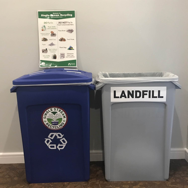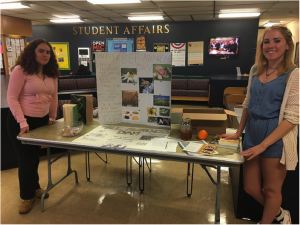- About Ramapo
- Academics
- Admissions & Aid
- Student Life
- Athletics
- Alumni
- Arts & Community
- Quick Links
- Apply
- Visit
- Give
Ramapo Green
March 22, 2021Arbor Day Foundation Honors Ramapo College of New Jersey with 2020 Tree Campus Higher Education® Recognition
Lincoln, Neb. (March 22, 2021) – Ramapo College of New Jersey was honored with 2020 Tree Campus Higher Education® recognition by the Arbor Day Foundation for its commitment to effective urban forest management.
“Tree Campuses and their students set examples for not only their student bodies but the surrounding communities showcasing how trees create a healthier environment,” said Dan Lambe, president of the Arbor Day Foundation. “Because of Ramapo College’s participation, air will be purer, water cleaner and students and faculty will be surrounded by the shade and beauty trees provide.”
The Tree Campus Higher Education program honors colleges and universities for effective campus forest management and for engaging staff and students in conservation goals. Ramapo College achieved the title by meeting Tree Campus Higher Education’s five standards, which include maintaining a tree advisory committee, a campus tree-care plan, dedicated annual expenditures for its campus tree program, an Arbor Day observance and student service-learning project. Currently there are 403 campuses across the United States with this recognition.
The Arbor Day Foundation has helped campuses throughout the country plant thousands of trees, and Tree Campus Higher Education colleges and universities invested more than $51 million in campus forest management last year. This work directly supports the Arbor Day Foundation’s Time for Trees initiative — an unprecedented effort to plant 100 million trees in forests and communities and inspire 5 million tree planters by 2022. Last year, Tree Campus Higher Education schools have collectively planted 39,178 trees and engaged 81,535 tree planters — helping us work toward these critical goals.
More information about the program is available at treecampushighered.org.
About the Arbor Day Foundation: The Arbor Day Foundation is a million-member nonprofit conservation and education organization with the mission to inspire people to plant, nurture and celebrate trees. More information is available at arborday.org.
Categories: campus sustainability, Sustainability
August 22, 2017Ramapo College Has Adopted Single-Stream Recycling
Recycling at Ramapo College is now easier than ever! Through the use of the Single-Stream Recycling program, we have eliminated the tedious and troublesome factors related to recycling. Time is no longer wasted by sorting recyclables and separate pick-up days. All materials collected for recycling are now non-sorted in one blue bin. In addition to ease of participation, this approach also delivers added efficiency by reducing vehicle miles for collection trucks and related tailpipe emissions.
Curious about how Single-Stream Recycling Works? WATCH THIS 3 MINUTE VIDEO

Every classroom, lab, studio, office and event space is equipped with two containers.
The BLUE container, labeled “Single-Stream Recycling,” is for all accepted recyclables. These include select glass, plastics, metals, cardboard and paper. Remember, all recyclables must be empty and free of liquids or food debris.
All other waste must be placed in the GRAY container, marked “Landfill”. This includes all food waste, contaminated recyclables and garbage.
For more details, please visit the Recycling Checklist on the left-hand menu.
Categories: campus sustainability, recycling
October 23, 2016Bee Awareness Day
Bee Awareness Day was one of the events organized during Ramapo College’s Campus Sustainability Week. It took place on Tuesday, October 18, 2016, in the Fishbowl.
During this event, the Ramapo College Beekeeping Club members talked to students and faculty about the importance of bees, why we need to save bees and other pollinators, and what kinds of things we can do to help them. In order to attract students and faculty, the Beekeeping Club members gave out free honey cookies, candy and reusable shopping bags.
Once, students and faculty were hooked on wanting to learn more about bees, the Beekeeping Club members asked them if they would sign a petition to ban Bee-killing pesticides and also if they wanted to join the Club as well.
Bee Awareness Day was a success because many students and faculty really did not know why bees are important, and the event helped raise awareness on issues such as Colony Collapse Disorder.
Bees are essential to us and they need us as much as we need them. By teaching others about them and by inspiring others to take action, we can start saving the bees and all the other pollinators out there.

Categories: campus sustainability
January 11, 2016Post-Consumer Food Waste Audit at The Trustees Pavilion
The Post-Consumer Food Waste Audit was a project run by the student environmental club 1STEP, Dining Services and the President’s Committee on Campus Sustainability. The Waste Audit Project, in fact grew from a coincidental conversation with Dining Services Operations Manager, Mr. David Carreras. While dining at The Trustees Pavilion, I noticed the absence of waste segregation at the dish disposal station. Incidentally, while returning dishes I met Mr. Carreras at the dish disposal station and the simple question of “Why not”—“Why is Ramapo not segregating organic waste to compost”—got us to talk more about it, and sparked the plan for a waste audit.
The enthusiastic support from Mr. Carreras, and interest from student clubs and Dr. Vasishth led to the launch of a pilot project to assess compostable food waste and to brainstorm ways to reduce food waste in the dining halls. Although it was initially daunting to find enough people to cover 37 hours in a week without compensation or course credits, with overwhelming help from 1STEP, the daunting task of implementing a waste audit became doable and we gathered a group of very committed students participate in the project. The pilot food waste audit project was implemented from October 26–30, 2015 and it’s objective was to measure food waste per plate during meal times at the Pavilion dining hall.
We audited waste from every plate during meal hours at Pavilion dining hall, for five consecutive days. Students were provided instructions to put their food waste in a special bucket. We kept track of both number of plates that scraped waste into the bucket and number of buckets that were filled by food waste. Our data on food waste showed that in the Pavilion dining hall, total food waste from that week was 403.4 pounds from 1637 plates.
| Day 1 | 410 plates | 102 lbs. of waste |
| Day 2 | 367 plates | 89 lbs. of waste |
| Day 3 | 310 plates | 84 lbs. of waste |
| Day 4 | 345 plates | 79 lbs. of waste |
| Day 5 (no dinner) | 205 plates | 49 lbs. of waste |
| Average Breakfast/Lunch Plates: | 210.4 | |
| Average Breakfast/Lunch Waste (lbs.): | 47 | |
| Average Dinner Plates: | 146.25 | |
| Average Dinner Waste (lbs.): | 42.1 | |
| Average Daily Plates: | 327.4 | |
| Average Daily Waste (lbs.): | 80.68 | |
| Average Waste/Plate (lbs.): | 0.246 | |
| Total Weakly Plates: | 1637 | |
| Total Weakly Waste (lbs.): | 403.4 | |
Our data show us that the very act of auditing reduced food waste to some extent—a progressive decline was perceptible over the five days of the audit. The most surprising observation was that desserts were the most discarded food from plates—though we did not quantify it. Maybe the next audit will quantify desserts wasted form food plates separately. This could possibly be the beginning of a new conversation on campus about food waste and health.The task was difficult and required great organizational skills, as many a times it meant phone conferences at 10 p.m., managing e-mails and scheduling meetings, updating information with Sodexo, etc. Unplanned events such as low battery on scale or something simple as not having a pen to note the data or just making sure that we had student presence through the day—in the midst of classes—to collect data were a few other obstacles. Despite the challenges, working in the cafeteria and asking students to segregate their food waste into compostable material was a rewarding experience. There was great enthusiasm for the project and most diners were keen to support us, and appreciated our initiative. A lady took a photo of me to share with a friend the wonderful initiative we have at Ramapo. Some diners were sorry for not having enough food waste to participate. Yes, there were some people who did not have a clue what “compostable” means and also, some were not too keen on engaging in a sustainability project; however they were a minority. What I learned the most is that with work and commitment it is easy to make a positive change.
Written by Francis Gryglak
Categories: campus sustainability, dining services, food waste
December 23, 2014Committee on Campus Sustainability Launched
Dear Friends,
President Peter P. Mercer has recently formed a Committee on Campus Sustainability, to oversee and coordinate all actions pertaining to campus sustainability.
As Chair of the President’s Committee on Campus Sustainability (PCCS), I invite you to join us in supporting this renewed push toward a more sustainable future.
This Fall has been a vigorous semester for us all. 300 of us turned out to show our support for the People’s Climate March in New York City…! Over 100 of us showed up to participate in the Campus Sustainability Day event. And many of you had to opportunity to participate in the Bundled Sustainability CEC offered this past semester.
We invite you to join our movement, to visit our current campaign, and to consider adding your support for campus sustainability at Ramapo College.
Please do bookmark the new Ramapo Green webpage and watch for developments over the next few weeks.
As always, feel free to reach out to me, if you have any suggestions or questions.
And here’s wishing all of us an absolutely fabulous New Year…!
Regards,
Ashwani Vasishth
Categories: campus sustainability
Copyright ©2025 Ramapo College Of New Jersey. Statements And Policies. Contact Webmaster.

Follow Ramapo Green